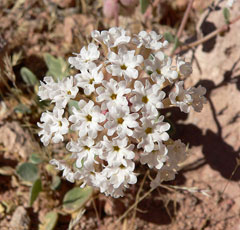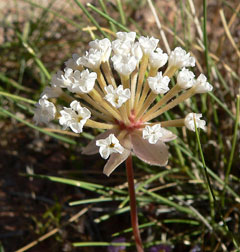 |
|
http://commons.wikimedia.org/wiki/User:Stan_Shebs |
 |
|
Translate this page:
Summary
Physical Characteristics

 Abronia turbinata is a PERENNIAL growing to 0.1 m (0ft 4in) by 0.5 m (1ft 8in). It is in flower from July to September. The species is hermaphrodite (has both male and female organs).
Abronia turbinata is a PERENNIAL growing to 0.1 m (0ft 4in) by 0.5 m (1ft 8in). It is in flower from July to September. The species is hermaphrodite (has both male and female organs).
Suitable for: light (sandy) soils and prefers well-drained soil. Suitable pH: mildly acid, neutral and basic (mildly alkaline) soils. It cannot grow in the shade. It prefers dry or moist soil. The plant can tolerate maritime exposure.
UK Hardiness Map
US Hardiness Map
Synonyms
Plant Habitats
Cultivated Beds; South Wall. By. West Wall. By.
Edible Uses
References More on Edible Uses
Medicinal Uses
Plants For A Future can not take any responsibility for any adverse effects from the use of plants. Always seek advice from a professional before using a plant medicinally.
A poultice of the mashed leaves has been applied to swellings[257].
References More on Medicinal Uses
The Bookshop: Edible Plant Books
Our Latest books on Perennial Plants For Food Forests and Permaculture Gardens in paperback or digital formats.

Edible Tropical Plants
Food Forest Plants for Hotter Conditions: 250+ Plants For Tropical Food Forests & Permaculture Gardens.
More

Edible Temperate Plants
Plants for Your Food Forest: 500 Plants for Temperate Food Forests & Permaculture Gardens.
More

More Books
PFAF have eight books available in paperback and digital formats. Browse the shop for more information.
Shop Now
Other Uses
References More on Other Uses
Cultivation details
We have very little information on this species and are not sure that it will be hardy in Britain, though judging by its native range it is likely to succeed outdoors only in the mildest areas of the country. The following notes are based on the general needs of the genus. Prefers a light well-drained sandy soil in full sun[200]. Seed is rarely ripened on plants growing in Britain[1].
References Carbon Farming Information and Carbon Sequestration Information
Temperature Converter
Type a value in the Celsius field to convert the value to Fahrenheit:
Fahrenheit:
The PFAF Bookshop
Plants For A Future have a number of books available in paperback and digital form. Book titles include Edible Plants, Edible Perennials, Edible Trees,Edible Shrubs, Woodland Gardening, and Temperate Food Forest Plants. Our new book is Food Forest Plants For Hotter Conditions (Tropical and Sub-Tropical).
Shop Now
Plant Propagation
Seed - sow autumn or early spring very shallowly in pots of sandy soil in a greenhouse[133]. Germination can be very slow unless you peel off the outer skin and pre-soak the seed for 24 hours in warm water[200, 245]. The seed usually germinates in 1 - 2 months at 15°c[133]. When large enough to handle, prick the seedlings out into individual pots and plant them out in early summer.
Other Names
If available other names are mentioned here
Native Range
NORTHERN AMERICA: United States (Oregon (se.), California (c.), Nevada)
Weed Potential
Right plant wrong place. We are currently updating this section.
Please note that a plant may be invasive in one area but may not in your area so it's worth checking.
Conservation Status
IUCN Red List of Threatened Plants Status :

Growth: S = slow M = medium F = fast. Soil: L = light (sandy) M = medium H = heavy (clay). pH: A = acid N = neutral B = basic (alkaline). Shade: F = full shade S = semi-shade N = no shade. Moisture: D = dry M = Moist We = wet Wa = water.
Now available:
Food Forest Plants for Mediterranean Conditions
350+ Perennial Plants For Mediterranean and Drier Food Forests and Permaculture Gardens.
[Paperback and eBook]
This is the third in Plants For A Future's series of plant guides for food forests tailored to
specific climate zones. Following volumes on temperate and tropical ecosystems, this book focuses
on species suited to Mediterranean conditions—regions with hot, dry summers and cool, wet winters,
often facing the added challenge of climate change.
Read More
Expert comment
Author
Torr. ex S.Watson.
Botanical References
270276
Links / References
For a list of references used on this page please go here
Readers comment
| Add a comment |
|
If you have important information about this plant that may help other users please add a comment or link below. Only comments or links that are felt to be directly relevant to a plant will be included. If you think a comment/link or information contained on this page is inaccurate or misleading we would welcome your feedback at [email protected]. If you have questions about a plant please use the Forum on this website as we do not have the resources to answer questions ourselves.
* Please note: the comments by website users are not necessarily those held by PFAF and may give misleading or inaccurate information.
To leave a comment please Register or login here All comments need to be approved so will not appear immediately.
|
Subject : Abronia turbinata
|
|
|
|